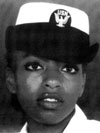
NEW YORK (FinalCall.com) – Two years after the tragic events of September 11, 2001 that left over 3,000 dead and scores wounded, Blacks still say that they feel that the media has ignored their suffering and their contributions on that day.
“It comes as no surprise to many Black Americans that they are virtually nonexistent in the memorializing of 9-11 and the horrifying disaster at the World Trade Center,” writes reporter Herb Boyd in the New York Amsterdam News.
The BET.com staff asked: “Where are the knowledgeable African Americans, and why haven’t they been interviewed on television and the newspapers?” Another question they asked in the aftermath of 9-11: “Where are the Black voices when anthrax was being spread around and a lot of Black people were dying?”
“It is important to know that people of every color died on that day,” award winning film editor Lillian Benson told The Final Call. In 2001, she edited “Roots: Celebrating 25 Years” and was nominated for an Emmy for her work on the civil rights series “Eyes on the Prize II.” Ms. Benson was in New York on September 11, 2003 for the premiere of her 30-minute documentary entitled “All Our Sons.”
She stated she was in California on 9-11, and stayed glued to coverage after the attacks and, as a media person, noticed that the mainstream press was not interviewing people of color. “I think it is easier for people to do things the conventional way. É They do not think to spread the net. Reporters may feel better speaking to someone who looks like them, but it is still negligence and it still is hurtful,” Ms. Benson stressed.
Ms. Benson introduced her film at the New York Historical Society to an audience composed of the families and friends of the 12 Black New York City firemen who died at the World Trade Center (WTC) on 9-11. She interviewed six mothers, one father and a spouse of the fallen firefighters. They never discussed the issue of racism and the media coverage, she said. She also said that she believes that the film is the first account by Blacks concerning 9-11.
Lieutenant Craig Kelly, a Black fireman living in Bridgeport, Connecticut, who became the inspiration behind the documentary, said that there was a real need for Blacks to see their story told about their experiences on 9-11.
Concerning the lack of coverage of Black suffering and heroism on 9-11, Ms. Benson said, “It seems like we, as Blacks, have to continue to prove ourselves in this society. It is like we still have to go the extra mile, so that people will believe that we are worthy of a place in this society.”
“The common thread that runs through the film is that the parents of the firemen we interviewed talked about the selflessness of their sons, that they know they died trying to help others, and that was the way they wanted the world to remember them,” Ms. Benson said.
That is the way we remember Marsha G. Cecil-Carter, 34, offered Lamont Ali, a member of the Brooklyn-based Committee To Honor Black Heroes. Ms. Carter worked as a bank reconciliation clerk for Carr Futures, which was located on the 92nd floor at One World Trade Center. Friends say that she was elated that she got a chance to hold her grandson for the first time two days before 9-11. “Marsha was a soldier’s soldier,” Queen of Queens, a Brooklyn activist told The Final Call. “And who will tell this sister’s story?” she asked. “We remember her as a person who wanted to help her people,” Mr. Ali said.
“There are many stories in our community that need telling,” Ms. Benson opined. “For instance,” she said, “there is Ms. Fannie Cherry, 84, who lost her fireman son Vernon Cherry at the WTC. On September 4, 2001, he brought three bouquets of flowers for her birthday. And when she asked him why so many, he said, ‘Because I love you so much, Mommy.’ That is how she remembers her son,” Ms. Benson added. “And when she told me that, I just fell apart,” she said.
Ms. Cherry said the last time her son was seen, he was helping other firemen pry open a door in the WTC. “My son helped a thousand people escape,” Ms Cherry said.
(The documentary was made on a shoe string budget, and another $10,000 is needed. For more information and donations, call (310) 315-7130 or visit www.alloursons.com.)












